Kevin DeYoung's Blog, page 63
December 29, 2014
Monday Morning Humor: 2014 Top Ten
“Your blog is great, at least every Monday.” I’ve heard that, or something like it, often. I’m never sure if I should cry or smile. I usually just thank you. If people can laugh a little on Monday, that’s not all bad. Here are the most watched MMH clips from 2014:
The real facts about using 140 characters or less.
Tim Hawkin’s take on Children’s Church at an Atheist Megachurch.
Some props are best left outside.
4. Frank Caliendo’s Rapid Fire of Impressions
Sports report, Frank Caliendo-style.
5. How to Play Oceans on the Drums
Proof why musicians should attend worship practice.
6. Things We Say Wrong [published 2011]
The English language is a mystery.
My kids favorite.
Why dogs are better than cats.
9. Kale
Jim Gaffigan doesn’t like kale. Neither do I.
10. Olympics
The Olympics according to Jerry Seinfeld.
December 24, 2014
Do You Know Who He Was?
 One of the Christmas traditions in my church growing up was that every year during the Christmas Eve service this one particular gentlemen would sing Sweet Little Jesus Boy. He was the right church member to sing the song. He was an old African American gospel singer, and he could sing it well. And even though it was a different style of music than all the other songs we would sing on Christmas Eve, it became a favorite of our almost entirely white congregation.
One of the Christmas traditions in my church growing up was that every year during the Christmas Eve service this one particular gentlemen would sing Sweet Little Jesus Boy. He was the right church member to sing the song. He was an old African American gospel singer, and he could sing it well. And even though it was a different style of music than all the other songs we would sing on Christmas Eve, it became a favorite of our almost entirely white congregation.
Sweet little Jesus Boy,
they made you be born in a manger.
Sweet little Holy Child,
didn’t know who You was.
Didn’t know you come to save us, Lord;
to take our sins away.
Our eyes was blind, we couldn’t see,
we didn’t know who You was.
The song was written in 1934 by Robert MacGimsey (1898-1979), a white man from Louisiana who made it his life’s work to learn, preserve, transcribe, and make accessible African American folk music from the South. MacGimsey wanted Sweet Little Jesus Boy to echo the sentiments of black Christians in the Civil War era. He once described his most famous song as more a meaning than a song: he pictured an aging black man whose life had been full of injustice “standing off in the middle of a field just giving his heart to Jesus in the stillness.”
The connection between our sufferings and Christ’s sufferings is powerful.
The world treat You mean, Lord;
treat me mean, too.
But that’s how things is down here,
we didn’t know t’was You.
And the refrain at the end of several of the verses has a haunting simplicity to it: “We didn’t who you was.”
Just seem like we can’t do right,
look how we treated You.
But please, sir, forgive us Lord,
we didn’t know ’twas You.
Sweet little Jesus Boy,
born long time ago.
Sweet little Holy Child,
and we didn’t know who You was.
Do you know who Jesus was?
Isaiah 9 hails the Messiah as the light of the world in a land of deep darkness. He is the child born under the oppression and eventual execution of the Roman government. He is our Wonderful Counselor and the Mighty God. He reveals to us the Everlasting Father. He is the Prince of Peace. Of the increase of his kingdom and peace there will be no end. He will rule with justice and righteousness from this time forth and forevermore.
So who was this child born of Mary?
A good teacher perhaps? That’s a popular answer: Jesus was really a humble prophet, a teacher of peace and justice. But some of his followers made up all these things about him–they invented the miracles and the exalted language about himself and the resurrection. Maybe the Christ of faith is completely different from the Jesus of history. Perhaps, but consider two major problems with this theory.
First, the only Jesus we have is the Jesus of faith. Virtually everything we know about Jesus is given to us through the eyes and pens of those who believed in him. So any attempt to find the historical Jesus behind the Jesus of faith is an attempt to find what we would like Jesus to be and not an attempt based on history. The only history we have about him comes from those who were changed by him. So either we are going to have to accept what Jesus’ followers said about him or admit that we can’t really know anything about this man.
The second problem with taking Jesus as simply a good moral teacher is that the people who argue for this approach almost never take into account all of Jesus’ teachings. What they mean is not so much that they respect Jesus as a teacher, but that Jesus was smart enough to say some of the same things they would say. So people appreciate Jesus the good teacher when he talks about turning the other cheek or walking the extra mile or giving to the needy. But they ignore all the parables Jesus told about weeping and gnashing of teeth and being cast into outer darkness. They love the Jesus of the Sermon on the Mount, except they breeze past the places where Jesus says those who refuse to forgive will be punished, and those controlled by lust will be thrown into hell, and divorce except on the grounds of sexual immorality is wrong, and everyone who doesn’t build his house on Jesus is a fool. We gravitate to the peace on earth, good will toward men, and overlook the times when Jesus says his coming would bring division on the earth and turn mother against daughter, brother against brother, and father against son. No one should hail Jesus as a great moral teacher until he reads through all that Jesus taught. Then you can decide if still think he was a good teacher.
So who was the baby the Magi came to worship?
How would you answer that question? As I see it, there are two consistent answers and two inconsistent answers.
The first inconsistent response is to take part of Jesus: “I’ll take the teachings I like and ditch the rest. I’ll take his good deeds but not his hard words. I’ll take his love for humanity and not his desire to glorify himself.” Now, don’t get me wrong, you can pick and choose what you like about Jesus. People do it all the time, but it’s inconsistent. Don’t say you follow Jesus or even that you think he’s a great teacher. Be honest enough to say “I like the ‘judge not’ line, the love your enemies bit, and the cup of cold water thing, and that’s about it. Other than that, Jesus was a quack and not really very nice.” To say anything else is inconsistent.
The second inconsistent response is to accept that Jesus is the Wonderful Counselor, Mighty God, Everlasting Father, Prince of Peace, and accept that he is the perfect Son of God, the King of the nations, the Righteous Judge, and the hope of the world, and then live like it doesn’t matter. If you thought I was God–and I don’t think I need to assure you I’m not–you would be very interested in what I thought, and how I wanted you to live, and what I was like. You would talk to me and worship me and tell others about my true identity. And if you did none of those things, it would be right to question whether you really thought I was God. Faith is more than intellectual assent to certain doctrines, it is an entire life based on the conviction that these doctrines are true.
So who is the babe in the straw?
The first consistent response is to say, “He’s a nobody. He didn’t even exist. Or if he did exist, we can’t know anything about him. The gospels are myths and legends with no grounding in history. I may like the victory from defeat theme in the gospels, but I don’t need Jesus for that. I don’t really care who this Jesus is and neither should you. The billions of Christians singing to Jesus this week are worshiping a figment of their imagination.” That would be consistent.
And the other consistent response is to believe the Jesus is the Son of God, to worship him, and obey: “Yes, Jesus you are the image of the invisible God. You are the sacrifice for our sins. You are the only way to the Father. You are the resurrection and the life. You are the once and coming King.”
I can’t persuade you to say that for yourself. I can try to show you that it is not unreasonable, and is in fact, plausible, but if you don’t want to believe, you will find a reason not to believe. Just try to be consistent. My prayer is (1) that those who accept all these things as true will live and die as if they were, and (2) that those who don’t yet accept these things will ask God to help them understand if these things are so. Because wouldn’t it be terrible to meet Jesus on that great getting up morning, look him in the eye and then look at each other and confess, “We didn’t know who you was.”
Once in Royal David’s City
The Christmas Eve service at King’s College always begins with this song. The boy soloist is chosen only shortly before the service.
The second video is from the following year and includes nearly an hour of beautiful singing. Merry Christmas
December 23, 2014
10 Ways We Can Remember to Be Christians this Christmas
 Christmas is almost here.
Christmas is almost here.
And that means many of us are tired, frazzled, stressed, and busy. The next two weeks will go by in a blur–from family, to church, to food, to family, to football, back to church, back to family, back to food, and then back to work.
We love Christmas. We can’t wait for the day to come, and many of us can’t wait for the season to be gone.
But whether you love every nook and cranny about the holidays–or consider most of it “noise, noise, noise!”–there is no excuse to be grinchy and scroogeish. Here are ten ways we can remember to be Christians this Christmas.
1. Sing like you mean it. Sure, there are a some Christmas carol clunkers, but there are some amazing hymns too (see Hark! the Herald Angels Sing, Of the Father’s Love Begotten, Let All Mortal Flesh, and many more). Belt them out with gusto. Smile and take delight in the familiar sounds of the season. You may not hear them for 11 more months.
2. Say thank you. Over the next week you’ll get gifts someone picked out for you and eat food someone prepared for you and enjoy hospitality someone laid out for you. We’re told to give thanks in all circumstances (1 Thess. 5:18). Surely, this includes Christmas. Stop to offer a sincere “thank you” to your mom, your husband, your kids, your aunt, your grandma, whomever–it will be good for your soul and it may just make their day.
3. Put the phone down. Go ahead and take a few pictures and post a few updates, but let’s not turn our Christmas experience into another commodity to be bought and sold. Look people in the eye. Be present in the moment. Let the world’s tragedies and scandals and funny cut videos take a back seat for a day.
4. Enjoy some cookies. Oh, the dreadful holiday pounds. Sure, we need to be on guard against gluttony. But we need to be on guard against censorious asceticism too. God created food to be received with thanksgiving. Eat up, and don’t feel bad about it. For everything created by God is good, and nothing is to be rejected that is made holy by the word of God and prayer (1 Tim. 4:3-5).
5. Talk to your family. Why not put in five minutes worth of thought on the way to your grandma’s house to think of five questions to ask of five different people? Maybe conversation flows easily with your family. But for many people, it takes some effort to engage our relatives, especially those we don’t see often and those with whom we have little in common. Give people the gift of your curiosity.
6. Find time to be quiet. At some point, get away and be still. Even if just for 10 minutes. Even if it’s in your bed after everyone else is asleep. Go on a walk. Take a long shower. Get up early. Sit in the dark. Stare at the tree. Just be quiet, ponder, and pray.
7. Pray for opportunities. What if we prayed for at least one opportunity in the next two weeks to share the gospel? I bet God would honor that prayer. Maybe we can talk to a friend or family member. Maybe we’ll find a surprisingly open door for conversation at the mall or out to eat or on the plane. Maybe we have not because we ask not.
8. Make a year-end gift. Your church is probably trying to make budget. So are rescue missions, crisis pregnancy centers, Christian schools, mission agencies, and dozens of other kingdom causes. Go ahead a be generous. We won’t out-give God.
9. Quit complaining. Something will go wrong this Christmas. Someone will hurt your feelings. Your parent’s house will be too hot. Your brothers house will be too cold. A meal will be barely edible. Your obnoxious friends will be extra obnoxious. Still, God is more pleased with gratitude than with grumbling. If we learn to overlook a few offenses we’ll be happier too.
10. Rejoice to hear the Story one more time. Matthew 1 and Luke 2 are coming at you. So are Isaiah 7 and 9, Micah 5, and many of the same passages you hear ever year. No bother: “To write the same things to you is no trouble to me and is safe for you” (Phil. 3:1). Let us pray that God gives us ears to hear, again and again, with fresh wonder that God came down to be with us and that he is with us still.
December 22, 2014
Monday Morning Humor
This is the pinnacle of seminary nerd humor. Good show, Josh Tyra, good show.
Makes you want to go watch Gilbert and Sullivan’s The Pirates of Penzance. And with subtitles.
December 19, 2014
Of the Father’s Love Begotten
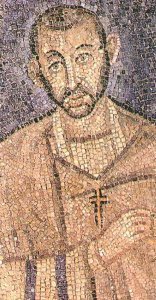 Aurelius Clemens Prudentius was born in Spain in 348 A.D. He was loyal to the Roman Empire and considered it an “instrument in the hands of Providence for the advancement of Christianity.”
Aurelius Clemens Prudentius was born in Spain in 348 A.D. He was loyal to the Roman Empire and considered it an “instrument in the hands of Providence for the advancement of Christianity.”
Thirty-five years prior to his birth, Christianity had been granted full toleration under the Edict of Milan. With Constantine’s conversion, Christianity became the favored religion of the Empire, a change that is oft maligned by younger evangelicals suspicious of “Christendom,” but must have been a welcome relief and answer to prayer for the beleagured saints in the fourth century.
Prudentius was trained to be a lawyer and rose to high office, serving as a powerful judge. He rose through the ranks of the state and finished his civil career as a court official for the Christian Emperor Theodosius.
At the age of fifty-seven, at the height of his power and prestige, Prudentius grew weary of civic life and considered his life thus far to have been a waste. He was having a midlife crisis (or, given the age span at the time, more like an almost-at-the-end-of-my-life crisis). So the successful lawyer, judge, and civil servant retired to write hymns and poetry. For the last decade of his life, before his death around 413, Prudentius wrote some of the most beautiful hymns of his day.
His poetry was treasured throughout the Middle Ages. His collection of twelve long poems (Cathemerinon), one for each hour of the day, became the foundation for several of the office hymns of the church. But without a doubt, Prudentius’ best known hymn today is Corde Natus Ex Parentis–Of the Father’s Love Begotten.
It was translated into English by John Mason Neale and Henry Baker in the 1850s. It was included in the book Hymns Ancient and Modern and given the plainsong chant-like melody Divinum Mysterium (Divine Mystery), which may date back as far as the twelfth century.
The hymn/poem originally contained nine verses. The song tells the story of redemption. Verse one speaks of the Son’s eternal nature. Verse two is about creation. Verse three chronicles the fall. Verse four moves into redemption with the virgin birth. Verse five links the Christ child to ancient prophecies. Verse six is a chorus of praise to the Messiah. Verse seven warns of final judgment for the wicked. Verse eight tells of men, women, and children singing their songs of praise. And verse nine concludes the hymn with a song of victory to Father, Son, and Holy Spirit. Most Christians will recognize many of the verses, but sadly not all.
Of the Father’s love begotten,
Ere the worlds began to be,
He is Alpha and Omega,
He the source, the ending He,
Of the things that are, that have been,
And that future years shall see,
Evermore and evermore!
At His Word the worlds were framèd;
He commanded; it was done:
Heaven and earth and depths of ocean
In their threefold order one;
All that grows beneath the shining
Of the moon and burning sun,
Evermore and evermore!
He is found in human fashion,
Death and sorrow here to know,
That the race of Adam’s children
Doomed by law to endless woe,
May not henceforth die and perish
In the dreadful gulf below,
Evermore and evermore!
O that birth forever blessed,
When the virgin, full of grace,
By the Holy Ghost conceiving,
Bare the Saviour of our race;
And the Babe, the world’s Redeemer,
First revealed His sacred face,
evermore and evermore!
This is He Whom seers in old time
Chanted of with one accord;
Whom the voices of the prophets
Promised in their faithful word;
Now He shines, the long expected,
Let creation praise its Lord,
Evermore and evermore!
O ye heights of heaven adore Him;
Angel hosts, His praises sing;
Powers, dominions, bow before Him,
and extol our God and King!
Let no tongue on earth be silent,
Every voice in concert sing,
Evermore and evermore!
Righteous judge of souls departed,
Righteous King of them that live,
On the Father’s throne exalted
None in might with Thee may strive;
Who at last in vengeance coming
Sinners from Thy face shalt drive,
Evermore and evermore!
Thee let old men, thee let young men,
Thee let boys in chorus sing;
Matrons, virgins, little maidens,
With glad voices answering:
Let their guileless songs re-echo,
And the heart its music bring,
Evermore and evermore!
Christ, to Thee with God the Father,
And, O Holy Ghost, to Thee,
Hymn and chant with high thanksgiving,
And unwearied praises be:
Honour, glory, and dominion,
And eternal victory,
Evermore and evermore!
I couldn’t find a real good rendition of the song online. The clip below is not much to look at (ok, there’s really nothing to look at), but the sound is lovely.
December 18, 2014
Best Books on the Best Sermon
Lord willing, I’ll finish my semester long series on the Sermon on the Mount next Sunday. It’s been a joy to preach from these three familiar chapters. I’ve been alternately challenged and comforted as I’ve studied Matthew 5-7 each week.
One of the great things (and difficulties) about preaching through the Sermon on the Mount is that there are so many resources available in English. I used no fewer than ten books regularly in my sermon preparation. Four books stood out above the rest.
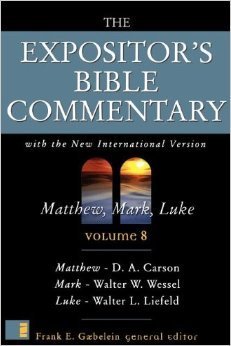 D.A Carson, Expositor’s Bible Commentary, Matthew 1-12 (Zondervan). This was the first commentary I read each week. Rarely did any of the other commentaries cover exegetical ground that wasn’t covered by Carson. There is no fluff here (Carson doesn’t do fluff!), and yet the content is communicated crisply and succinctly. There are only a few commentary writers you need to read no matter what they write on: Moo, O’Brien, and Carson are three of my must haves, and this is vintage Carson.
D.A Carson, Expositor’s Bible Commentary, Matthew 1-12 (Zondervan). This was the first commentary I read each week. Rarely did any of the other commentaries cover exegetical ground that wasn’t covered by Carson. There is no fluff here (Carson doesn’t do fluff!), and yet the content is communicated crisply and succinctly. There are only a few commentary writers you need to read no matter what they write on: Moo, O’Brien, and Carson are three of my must haves, and this is vintage Carson.
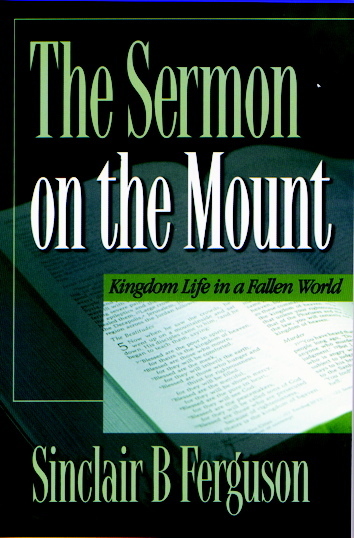 Sinclair B. Ferguson, The Sermon on the Mount: Kingdom Life in a Fallen World (Banner of Truth). This little book is, not surprisingly, more sermonic and less scholarly. The second half of the book moves almost too quickly through Matthew 6 and 7, but the first 100 pages on Matthew 5 (especially on the Beatitudes) are terrific.
Sinclair B. Ferguson, The Sermon on the Mount: Kingdom Life in a Fallen World (Banner of Truth). This little book is, not surprisingly, more sermonic and less scholarly. The second half of the book moves almost too quickly through Matthew 6 and 7, but the first 100 pages on Matthew 5 (especially on the Beatitudes) are terrific.
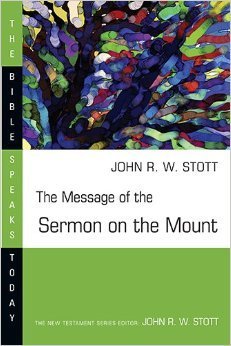 John R. W. Stott, The Message of the Sermon on the Mount (IVP Academic). I’ve used a lot of Stott commentaries over the years, and I think this is his best. No one has better outlines than Stott. That’s the preacher’s problem: you have to come up with your outline before you read Stott, or you’ll always use his outline! From time to time, Stott chases rabbits that don’t seem as relevant now (i.e., taking time on multiple occasions to refute Tolstoy), but overall this is Stott doing what Stott did so masterfully: profundity of thought in economy of expression. If it’s not been done already, someone should start a @JohnStottSays twitter handle. I bet you could find several hundred tweets in this book alone. If I had to use just one book in preparation for these sermon, I’d probably use this one.
John R. W. Stott, The Message of the Sermon on the Mount (IVP Academic). I’ve used a lot of Stott commentaries over the years, and I think this is his best. No one has better outlines than Stott. That’s the preacher’s problem: you have to come up with your outline before you read Stott, or you’ll always use his outline! From time to time, Stott chases rabbits that don’t seem as relevant now (i.e., taking time on multiple occasions to refute Tolstoy), but overall this is Stott doing what Stott did so masterfully: profundity of thought in economy of expression. If it’s not been done already, someone should start a @JohnStottSays twitter handle. I bet you could find several hundred tweets in this book alone. If I had to use just one book in preparation for these sermon, I’d probably use this one.
 D. Martyn Lloyd-Jones, Studies in the Sermon on the Mount (Eedermans). It’s rare that a book published in the last fifty-five years can, without exaggeration, be called a classic, but this one certainly deserves the label. I first read this book when I was in college. Later I fell in love with my wife because, among other great qualities, she was reading the Doctor on the Sermon on the Mount. Yes, the book is repetitive, but so much of it bears repeating. It’s hard to read multiple sermons every week in sermon prep, so just read the book at at a reasonable pace for your own spiritual good. You won’t regret it.
D. Martyn Lloyd-Jones, Studies in the Sermon on the Mount (Eedermans). It’s rare that a book published in the last fifty-five years can, without exaggeration, be called a classic, but this one certainly deserves the label. I first read this book when I was in college. Later I fell in love with my wife because, among other great qualities, she was reading the Doctor on the Sermon on the Mount. Yes, the book is repetitive, but so much of it bears repeating. It’s hard to read multiple sermons every week in sermon prep, so just read the book at at a reasonable pace for your own spiritual good. You won’t regret it.
December 17, 2014
The Eagles Are Coming! The Eagles Are Coming!
 J.R.R. Tolkien famously described the gospel story as a eucatastrophe–a good catastrophe, or, the joy of a happy ending coming out of seeming defeat. David Mathis has written a great piece on this point. In a similar vein, Jonathan Witt and Jay Richards explain Tolkien’s vision of good news in a sad world:
J.R.R. Tolkien famously described the gospel story as a eucatastrophe–a good catastrophe, or, the joy of a happy ending coming out of seeming defeat. David Mathis has written a great piece on this point. In a similar vein, Jonathan Witt and Jay Richards explain Tolkien’s vision of good news in a sad world:
Tolkien goes on to elaborate his point about the evangelium. The perfect tale of the “good catastrophe”, the one that “entered History and the primary world”, is the story of the Incarnation, Crucifixion, and when all hope was lost among the apostles, the Resurrection of the Son of God.
In Tolkien’s secondary world of Middle-Earth, it’s the eleventh hour and a happy reversal when the old thrush lights on Bard’s shoulder when all seems lost and the arrow from the great Yew bow speeds through the air and finds the hollow on the belly of the dragon.
It’s the shout of hope, “The Eagles are coming! The Eagles are coming!” just when all hope seems lost.
And it’s Frodo, defeated by the ring in the final pinch, placing it on his finger only to have the wicked Gollum tackle him, bite the ring off his finger, and, cackling in victory, stumble and fall into the flames of Mount Doom, destroying Sauron’s ring and saving the West—not by mere chance but rather, as Gandalf explained to Frodo, because another and higher purpose, quite apart from the workings of darkness, is also at work in the world.
A perfect healing and an immortality, beyond the tiresome longevity offered by the rings of power, is the faith and hope of Frodo, Bilbo, Gandalf, and the elves who together set sail from the Grey Havens at the end of The Lord of the Rings. On this voyage, when the elven ship has “passed on into the West, . . . on a night of rain” and with a sweet fragrance in the air, suddenly, “The grey rain-curtain turned all to silver glass and was rolled back”, and the wounded Frodo beholds “white shores and beyond them a far green country under a swift sunrise.”
Here is a glimpse of something indispensable; but not just here in Tolkien. His life and work, taken as a whole, clearly reflected his belief in “a far green country”, in a “better country” beyond death—a belief, moreover, that a steadfast hope in both it and its maker could lend on the courage to pursue good in the face of evil, to work patiently and humbly in whatever plot of ground one is tending by choice, calling, and circumstance; and that, in looking forward to that better country, where our good works will find their full flowering, we will have the patience and wisdom to avoid the folly of pursuing a Heaven here on Middle-Earth, even as we labor creatively for the greater good. (183-84)
That’s a beautiful picture. And Tolkien’s books are even better. And the Reality to come is better still.
December 16, 2014
Top Ten Books of 2014
This list is not meant to assess the thousands of Christian books published each year, let alone every interesting book published in 2014. I read a lot of books, but there are plenty of worthy titles that I never touch (and never hear of). This is simply a list of the books (Christian and non-Christian, but all non-fiction) that I thought were the best in the past year (including the last months of 2013).
When I say “best” I have several questions in mind:
• Was this book well written and enjoyable to read?
• Did I find it personally challenging, illuminating, edifying, or entertaining?
• Is it a book I am likely to reread or consult often?
• Do I see myself frequently recommending this book to others?
Undoubtedly, the “best” books reflect my interests and inklings. This doesn’t mean I agree with every point in all these books, but it does mean I found them helpful and insightful. There is nothing scientific about my list, but here goes:
Honorable Mentions:
Adam T. Barr and Ron Citlau, Compassion Without Compromise: How the Gospel Frees Us to Love Our Gay Friends Without Losing the Truth (Bethany House)
Daniel I. Block, For the Glory of God: Recovering a Biblical Theology of Worship (Baker Academic)
Andrew B. McGowan, Ancient Christian Worship: Early Church Practices in Social, Historical, and Theological Perspective (Baker Academic)
Top Ten
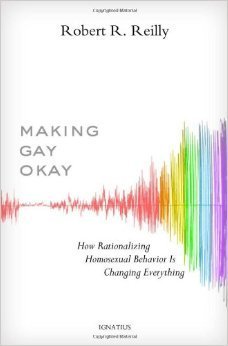 10. Robert R. Reilly, Making Gay Okay: How Rationalizing Homosexual Behavior Is Changing Everything (Ignatius). A frank and unsparing examination of the push to legitimize homosexual behavior in science, in law, in education, in the military, and in the political process. Eye opening.
10. Robert R. Reilly, Making Gay Okay: How Rationalizing Homosexual Behavior Is Changing Everything (Ignatius). A frank and unsparing examination of the push to legitimize homosexual behavior in science, in law, in education, in the military, and in the political process. Eye opening.
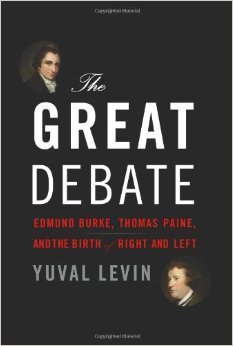 9. Yuval Levin, The Great Debate: Edmund Burke, Thomas Paine, and the Birth of Right and Left (Basic Books). Akin to Thomas Sowell’s Conflict of Visions, Levin shows how issues like justice, nature, history, order, and reason can be understood differently depending on your frame of reference. Although himself a man of the right, this is not a partisan book. Levin’s analysis is evenhanded and judicious.
9. Yuval Levin, The Great Debate: Edmund Burke, Thomas Paine, and the Birth of Right and Left (Basic Books). Akin to Thomas Sowell’s Conflict of Visions, Levin shows how issues like justice, nature, history, order, and reason can be understood differently depending on your frame of reference. Although himself a man of the right, this is not a partisan book. Levin’s analysis is evenhanded and judicious.
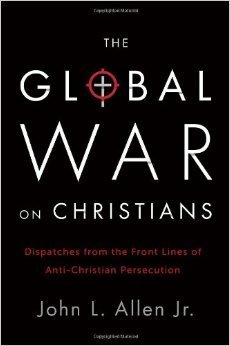 8. John L. Allen Jr., The Global War on Christians: Dispatches from the Front Lines of Anti-Christian Persecution (Image). Although many people still think of Christianity as a powerful agent of repression in the world, Allen shows that from a global perspective, Christians are much more the oppressed than the oppressor. Read, weep, pray, act.
8. John L. Allen Jr., The Global War on Christians: Dispatches from the Front Lines of Anti-Christian Persecution (Image). Although many people still think of Christianity as a powerful agent of repression in the world, Allen shows that from a global perspective, Christians are much more the oppressed than the oppressor. Read, weep, pray, act.
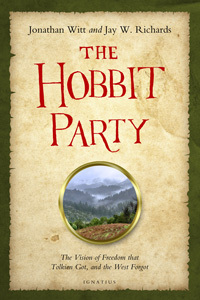 7. Jonathan Witt and Jay W. Richards, The Hobbit Party: The Vision of Freedom that Tolkien Got, and the West Forgot (Ignatius). More people should be talking about this book. It’s full of excellent background information on Tolkien and the worldview that shaped his creation of Middle Earth. Even LOTR enthusiasts will see things they hadn’t seen before.
7. Jonathan Witt and Jay W. Richards, The Hobbit Party: The Vision of Freedom that Tolkien Got, and the West Forgot (Ignatius). More people should be talking about this book. It’s full of excellent background information on Tolkien and the worldview that shaped his creation of Middle Earth. Even LOTR enthusiasts will see things they hadn’t seen before.
 6. Anthony Esolen, Defending Marriage: Twelve Arguments for Sanity (Saint Benedict Press). Exceptionally well written and full of cogent arguments (including some you may not have considered). This is not a book on Scripture or scientific research, but a deft cultural analysis that makes sanity look sane again.
6. Anthony Esolen, Defending Marriage: Twelve Arguments for Sanity (Saint Benedict Press). Exceptionally well written and full of cogent arguments (including some you may not have considered). This is not a book on Scripture or scientific research, but a deft cultural analysis that makes sanity look sane again.
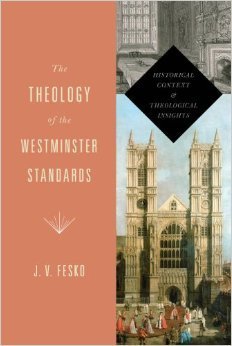 5. J.V. Fesko, The Theology of the Westminster Standards: Historical Context and Theological Insights (Crossway). The last few years have a seen a steady stream of high quality books on the Westminster Standards. This is one of the best–theologically nuanced and historically sensitive. Less scholarly, but more accessible, is the volume by Chad Van Dixhoorn, Confessing the Faith: A Reader’s Guide to the Westminster Confession of Faith (Banner of Truth). I haven’t had the opportunity to read Van Dixhoorn’s book yet, or it would likely be in my top ten.
5. J.V. Fesko, The Theology of the Westminster Standards: Historical Context and Theological Insights (Crossway). The last few years have a seen a steady stream of high quality books on the Westminster Standards. This is one of the best–theologically nuanced and historically sensitive. Less scholarly, but more accessible, is the volume by Chad Van Dixhoorn, Confessing the Faith: A Reader’s Guide to the Westminster Confession of Faith (Banner of Truth). I haven’t had the opportunity to read Van Dixhoorn’s book yet, or it would likely be in my top ten.
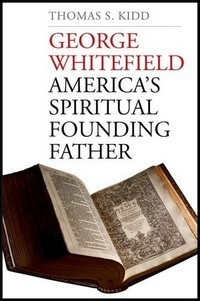 4. Thomas S. Kidd, George Whitefield: America’s Spiritual Founding Father (Yale). Scholarly yet readable; detailed yet not overwhelming. I expect this edifying and instructive book will be used for a long time by serious Christians and interested academics.
4. Thomas S. Kidd, George Whitefield: America’s Spiritual Founding Father (Yale). Scholarly yet readable; detailed yet not overwhelming. I expect this edifying and instructive book will be used for a long time by serious Christians and interested academics.
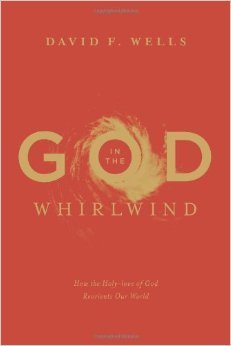 3. David F. Wells, God in the Whirlwind: How the Holy-love of God Reorients Our World (Crossway). After years of pointing out the shallowness of evangelicalism, this is Well’s masterful summary of what should be our depth, our ballast, our center. If you’ve never read David Wells before, you can now start here.
3. David F. Wells, God in the Whirlwind: How the Holy-love of God Reorients Our World (Crossway). After years of pointing out the shallowness of evangelicalism, this is Well’s masterful summary of what should be our depth, our ballast, our center. If you’ve never read David Wells before, you can now start here.
 2. David Helm, Expositional Preaching: How We Speak God’s Word Today (Crossway). This little book is simply outstanding. It’s the best short book on preaching I’ve read. Helm’s advice is unfailingly wise, theologically informed, and extremely practical.
2. David Helm, Expositional Preaching: How We Speak God’s Word Today (Crossway). This little book is simply outstanding. It’s the best short book on preaching I’ve read. Helm’s advice is unfailingly wise, theologically informed, and extremely practical.
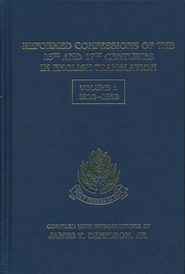 1. Reformed Confessions of the 16th and 17th Centuries in English Translation, Four Volumes (Reformation Heritage books). Although this set has been around for several years, the fourth and final volume was only published this last year. The result: a remarkable collection of 127 Reformed confessions from 1523-1693. While the Westminster Standards and the Three Forms of Unity may be the most well known, the other 100 documents must not be ignored. These four volumes are full of rich theology and history. Pastors, raid your book budget and get this invaluable resource in your study.
1. Reformed Confessions of the 16th and 17th Centuries in English Translation, Four Volumes (Reformation Heritage books). Although this set has been around for several years, the fourth and final volume was only published this last year. The result: a remarkable collection of 127 Reformed confessions from 1523-1693. While the Westminster Standards and the Three Forms of Unity may be the most well known, the other 100 documents must not be ignored. These four volumes are full of rich theology and history. Pastors, raid your book budget and get this invaluable resource in your study.



